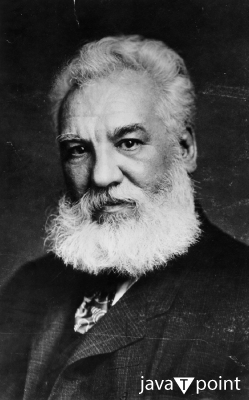Graham Bell
Alexander Graham Bell, a Scottish-born Canadian-American inventor, scientist, and engineer, is most known for creating the telephone. Bell, who was born in Edinburgh, Scotland, on March 3, 1847, was driven by a lifelong curiosity and a desire to unravel the secrets of sound and communication.

His ground-breaking work had a profound impact on science and education, in addition to revolutionizing how people communicate across distances.
Early Life and Education
Alexander Graham Bell was raised in a household deeply rooted in the art of speaking and elocution. Eliza Grace Symonds Bell was deaf, and Alexander Melville Bell, his father, was a well-known lecturer on voice physiology and elocution. Bell's interest in the principles of sound and language was ignited by his early exposure to the difficulties of speech and communication as well as his mother's deafness.
Bell, who attended the Royal High School of Edinburgh, showed a strong interest in the sciences and a natural knack for studying at a young age. In 1865, his family relocated to London, where he pursued his further studies at University College London. But Bell's younger brother's death from TB was a personal sorrow that would later influence his dedication to developing remote communication methods.
Emigration to Canada
Bell moved to Canada with his parents in 1870 in search of a change of scenery and motivation from his father's work, educating people who were deaf or hard of hearing. After moving to Brantford, Ontario, Bell started a journey that would eventually lead him to create some of the most important innovations of the 1800s.
Passion for the Deaf
Bell entered the field of deaf education after obtaining a position as a teacher for people who are deaf or hard of hearing in Canada. His experience with deaf kids inspired him to look for methods to enhance communication for everyone, not just those who have hearing loss. His commitment to improving communication was essential to the creation of his innovations.
Invention of the Telephone
Bell's fascination with electrical speech transmission led to the creation of the telephone, the most famous invention ever. Bell came up with the concept of reproducing sound waves using different electric currents when he was working on the multiple telegraph. He created history on March 10, 1876, when he used a telephone to send the first understandable message. Talking to Thomas Watson, his assistant, Bell spoke the well-known line, "Mr. Watson, come here, I want to see you."
The telephone's invention transformed communication and made it possible to link people in previously unthinkable ways over great distances. A well-known court struggle over the invention of the telephone resulted from Bell's telephone patent, which was submitted on the same day as Elisha Gray's comparable innovation. In the end, Bell's patent was maintained, solidifying his status as the telephone's creator in history.
Scientific Contributions Beyond the Telephone
Bell earned his fame and reputation in the telephone industry, but his contributions to science went well beyond this ground-breaking device. Bell worked on a number of scientific projects, such as the photophone—a device that projected sound onto a beam of light—and the metal detector, which was first developed to find the bullet that had killed President James A. Garfield during an assassination attempt.
Bell also experimented with tetrahedral structures and kites in the field of aeronautics. His fascination with aviation gave rise to the Aerial Experiment Association, a trailblazing organization that focused on the development of early aircraft and featured notables such as Glenn Curtiss. One of Canada's earliest powered flights, the Silver Dart, was the product of this cooperative effort.
Legacy in Education
Bell made a substantial contribution to education and the growth of knowledge in addition to his scientific and inventive accomplishments. Then, in 1890, he assisted in the founding of the Volta Bureau, which is today the Alexander Graham Bell Association for the Deaf and Hard of Hearing. He then became a professor of voice physiology at Boston University. The bureau's goals were to further deafness science and encourage the teaching of speech to deaf people.
As a trustee at Clark University, where he was instrumental in founding the country's first university-based psychology laboratory, Bell demonstrated his dedication to education. Future advancements in psychology were made possible by his interest in the study of the mind and the transmission of thinking.
Personal Life and Honors
In his private life, Alexander Graham Bell had both successes and setbacks. One of his previous deaf students, Mabel Gardiner Hubbard, was the woman he married in 1877. Bell's lifelong commitment to his family was clear, as the couple raised four children. Bell received several honors, which attested to the significance of his scientific discoveries and achievements. He was awarded the Volta Prize by the French government in 1880 for inventing the telephone. Bell headed the National Geographic Society from 1896 to 1904 and was one of its founding members.
Alexander Graham Bell died in 1922 at Beinn Bhreagh, his home in Nova Scotia, Canada. Nonetheless, his influence is still felt in the fields of science, education, and communication.
Conclusion
Throughout his life, Alexander Graham Bell demonstrated inventiveness, intellectual curiosity, and a strong desire to make a positive difference in the lives of others. Bell's legacy is a monument to the creative potential of people, spanning from his early obsession with sound and communication to the development of the telephone and beyond. His influence extends well beyond the communication domain, having an impact on subjects as varied as psychology, aviation, and education.
When we consider the life of this Scottish-born Canadian-American engineer, scientist, and inventor, we see how profoundly his achievements have impacted modern society's ability to connect and communicate. Future generations can draw inspiration from his narrative, which shows that creativity and the search for knowledge can result in game-changing discoveries that alter the path of history.